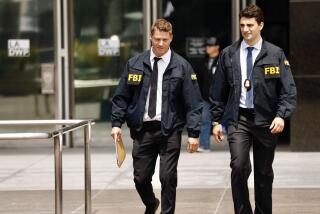Justice Department probes TCW’s fight with DoubleLine’s Jeffrey Gundlach
- Share via
The bitter split-up of L.A. investment firm TCW Group and its former chief investment officer, Jeffrey Gundlach, is under investigation by the Justice Department.
An updated federal filing by mutual funds managed by Gundlach’s year-old company, DoubleLine Capital, disclosed that some employees and former employees of DoubleLine have been interviewed by officials from the U.S. attorney’s office in Manhattan.
Also, TCW, which nearly a year ago sued Gundlach for alleged theft of TCW proprietary information, confirmed that it had received a federal criminal grand jury subpoena “with regard to the investigation of DoubleLine and its principals for trade-secret theft,” said Steve Madison, an attorney at TCW’s outside counsel, Quinn Emanuel.
“TCW is cooperating fully with the investigation and has been informed that it is the victim in this particular matter,” Madison said. He declined to say when the subpoena was issued.
The Justice Department’s interest in the battle between TCW and Gundlach, who became a star bond fund manager in his 24 years at the firm, sharply raises the stakes in their conflict.
The government’s interest in the case may have begun with the special inspector general of the Troubled Asset Relief Program.
TCW, which manages $111 billion, was among a group of firms chosen last year to manage investment funds for the U.S. Treasury under the so-called Public Private Investment Program, or PPIP, which mixed government funds with private funds to buy toxic assets from banks.
Gundlach, an expert on mortgage bonds, had been expected to lead the new TCW fund, which raised a total of $500 million last fall. But on Dec. 4, 2009, TCW abruptly fired Gundlach, saying that he had been threatening to leave and take his bond staff with him.
Two weeks later, Gundlach formed DoubleLine, and the majority of his TCW team quickly followed him there.
After Gundlach’s ouster, the Treasury suspended the fund that TCW had raised for the PPIP. Under TCW’s agreement with the government, the Treasury had the right to put the fund on hold while it requested information about who at TCW would be managing the portfolio, absent Gundlach.
In January, TCW dropped out of the program and returned the $500 million to the investors.
Also in January, TCW sued Gundlach, alleging that he and his team engaged in “wholesale theft of vast quantities of TCW proprietary information” before they left and used that information to set up DoubleLine.
Gundlach has denied the charges and has countersued. The case is scheduled to go to trial in July in Los Angeles County Superior Court.
When DoubleLine launched its retail mutual funds in April, the firm disclosed in a federal filing that an employee had been interviewed by “personnel from a governmental agency” in connection with the PPIP and related to the “same allegations with respect to misappropriation of proprietary information made by [TCW] in its litigation against” DoubleLine.
In a filing that the funds made Monday, the disclosure was expanded to say that “employees and former employees of [DoubleLine] have been interviewed by representatives of the special inspector general of the Troubled Asset Relief Program, and by the office of the United States attorney for the Southern District of New York, in connection with the PPIP and in connection with the same allegations of misappropriation of proprietary information made by [TCW] in its litigation against” DoubleLine.
DoubleLine “understands that the inquiry stems at least in part from a federal grand jury inquiry,” the filing said.
The firm, which now manages $6.8 billion, said it “has cooperated with the inquiry and has voluntarily produced documents.”
A DoubleLine spokesman said the firm’s disclosure about the probe was rewritten after the company received “additional clarity about which government agencies were involved.”
It isn’t clear why the government is interested in the matter — for example, whether prosecutors are focusing on the alleged theft of TCW’s information or specifically on whether government information related to the PPIP fund was compromised.
A spokeswoman for the U.S. attorney in Manhattan declined to comment.
More to Read
Sign up for Essential California
The most important California stories and recommendations in your inbox every morning.
You may occasionally receive promotional content from the Los Angeles Times.










